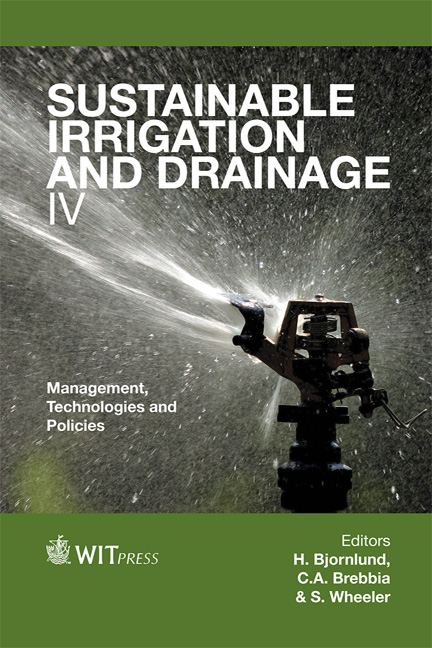Effects Of Deficit Irrigation On Yield And Water Use Of Grown Cucumbers In Saudi Arabia
Price
Free (open access)
Transaction
Volume
168
Pages
6
Page Range
353 - 358
Published
2012
Size
381 kb
Paper DOI
10.2495/SI120301
Copyright
WIT Press
Author(s)
A. M. Alomran & I. I. Luki
Abstract
Deficit irrigation can play an important role in increasing water use efficiency (WUE) and reduced amount of irrigation. Deficit irrigation generally refers to fully irrigated crops where water is reduced or withheld during certain growth stages. In this study, a series of greenhouse and open field experiments were conducted using a deficit irrigation program on cucumber crops under drip irrigation during 2007–2010 growing seasons. The layout of the experiment was a completely randomized design with four replicates. Irrigation treatments consisted of five levels of ETc (30, 40, 60, 80, and 100% of ETc) in addition to traditional practice by farmers. At 60 and 80% treatments, deficit irrigation tested at different growth stages (development, med, and late stages of the growth) for a total of 14 treatments at each experiment. The maximum amount of water applied to the crop was 332 mm for the 100%ETc treatment while the minimum water applied was 100 mm for 30%Etc treatment, and 600 mm for traditional practice by the farmers in the region. The calculated ETc ranged from between 95 and 316 mm for the different treatments. The objective of the study was to determine the crop water requirements in both the open field and greenhouse and calculate crop response factor (ky) and WUE of cucumber crop using a deficit irrigation program at different stages of growth. Results indicated that a cucumber could stand the shortage of water during the growth and crop response (Ky) values ranging between 0.7 and 0.98. However, the amount of water used was much lower than that of the traditional method used by farmers in the region. Water use efficiency (WUE) and water productivity (WP) values increased when water amounts decreased with the exception of the traditional irrigation; these values decreased to 45.6 and 24 kg/m3, respectively. The highest values at much stressed treatment 30% ETc. Keywords: deficit irrigation, crop response factor, water use efficiency, drip irrigation, crop water requirement.
Keywords
deficit irrigation, crop response factor, water use efficiency, drip irrigation, crop water requirement.





